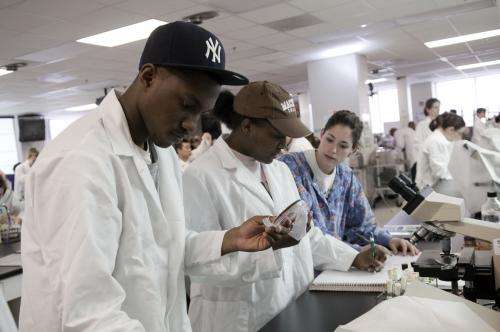Creating a more diverse future for biomedicine

Some minority groups are underrepresented in the biomedical sciences, but a new federally-funded program at Michigan State University – the first of its kind in Michigan – could help boost those numbers.
The National Institute for General Medical Sciences, a division of the National Institutes of Health, has awarded MSU a three-year $500,000 grant to encourage more minority students to pursue doctoral study in the biomedical sciences and engineering.
NIH is targeting underrepresented minority students, which it defines as African Americans, Hispanic Americans, American Indians, Alaska Natives and U.S. Pacific Islanders.
Modeled after the Honors College's Professorial Assistantship program, Spartan Minority Access to Research Careers - Undergraduate Student Training for Academic Research (known as MARC U STAR) will launch this fall, eventually providing four undergraduates per year with tuition, fees and a stipend.
"MARC scholars will have a unique preparatory experience for graduate school," said psychology professor Cheryl Sisk, program director of the Interdisciplinary Pre-doctoral Training Program in Neuroscience in the College of Natural Science. "It provides not only intensive research experience and training in the scientific process, but also the honing of critical communication skills that are predictors of success in graduate school."
There are two phases of the program: pre-MARC and MARC. As part of the grant, MSU will develop a pipeline of potential MARC fellows through the pre-MARC program, which focuses on exposure to research through seminars, courses and workshops, said Justin Micomonaco, academic specialist for the Honors College. In the spring of a student's sophomore year, they can apply to be a MARC fellow. MARC fellows are placed in a research position working for a faculty member during their junior and senior years.
Micomonaco will focus on programming and evaluation, and Jerry Caldwell, director of the Charles Drew Science Scholars program, will lead student support efforts, helping to link MARC U STAR to MSU's research community.
"We have the faculty and facilities to provide quality research opportunities to students; combining these resources with the MARC grant will position MSU to make long-term change," said Cynthia Jackson-Elmoore, dean of the Honors College. "Equally important is that MARC is consistent with MSU's overall goal of providing a steady pipeline of STEM Ph.D.s in biomedical sciences."
Provided by Michigan State University